All About Room Renting in Singapore
01 Oct 2024
Singapore’s rental market is diverse and dynamic, offering a variety of accommodation options to suit different needs and budgets. Whether you’re a student, a young professional, an expat, or a couple, you’ll find that room rentals and shared homes are popular choices due to their affordability, convenience, and the opportunity to live in vibrant communities. Read on to learn more about room renting in Singapore!

1. Benefits of Room Rentals and Shared Homes
Renting a room in a shared home has numerous advantages:
- Affordability: Compared to renting an entire apartment, room rentals are significantly cheaper, allowing you to save on housing costs.
- Community: Living with others can help you build a social network quickly, making it easier to settle into your new environment.
- Flexibility: Traditional leases in Singapore range between one to two years. Room rentals often come with shorter lease terms, providing flexibility if you’re unsure about your long-term plans.
- Convenience: Many shared homes come fully furnished, reducing the hassle of setting up a new home.
2. Why Choose Room Rentals in Singapore?
Renting a room is an excellent option for various reasons, including:
- Cost-effective: Room rentals are generally more affordable than renting an entire flat or house, making them ideal for budget-conscious individuals. Especially with the recent news that Singapore is one of the most expensive cities for expats to live in, room renting might be a smart choice when you first move!
- Networking Opportunities: Sharing a flat with others can lead to new friendships and professional connections. Especially if you are moving on your own this is a great opportunity for you to get to know others in the same boat as you.
- Convenient Locations: Many room rentals are located in prime areas close to public transport, making commuting to work or school easier.
3. What Casa Mia Coliving Residents Say?
To give you a better sense of what to expect, here are some experiences from current tenants at Casa Mia Coliving:
- Gabby, 28-32, Transaction Manager: “Casa Mia has been nothing but an amazing Coliving Home provider. Being in Singapore for more than 2 years and having tried out both traditional and flexible leases, I can honestly say it had been the best experience being with them as they provide everything you would need especially being new to the country {such as} a fully furnished apartment and fun events to meet your fellow member.
- Disha, 18-22, International Student: “Casa Mia is hands down the best coliving space you can find in Singapore. They have great rooms at an affordable price (if you rent for one year), their services are mind blowing. I have been staying with Casa mia for 2 years now and I can finally say that I found my home away from home.Casa mia does everything they can to make sure that their members have a comfortable stay and good facilities in Singapore. They have wide range of homes and rooms that you can choose from and the house are usually in the locations where in the transport is easily accessible.”
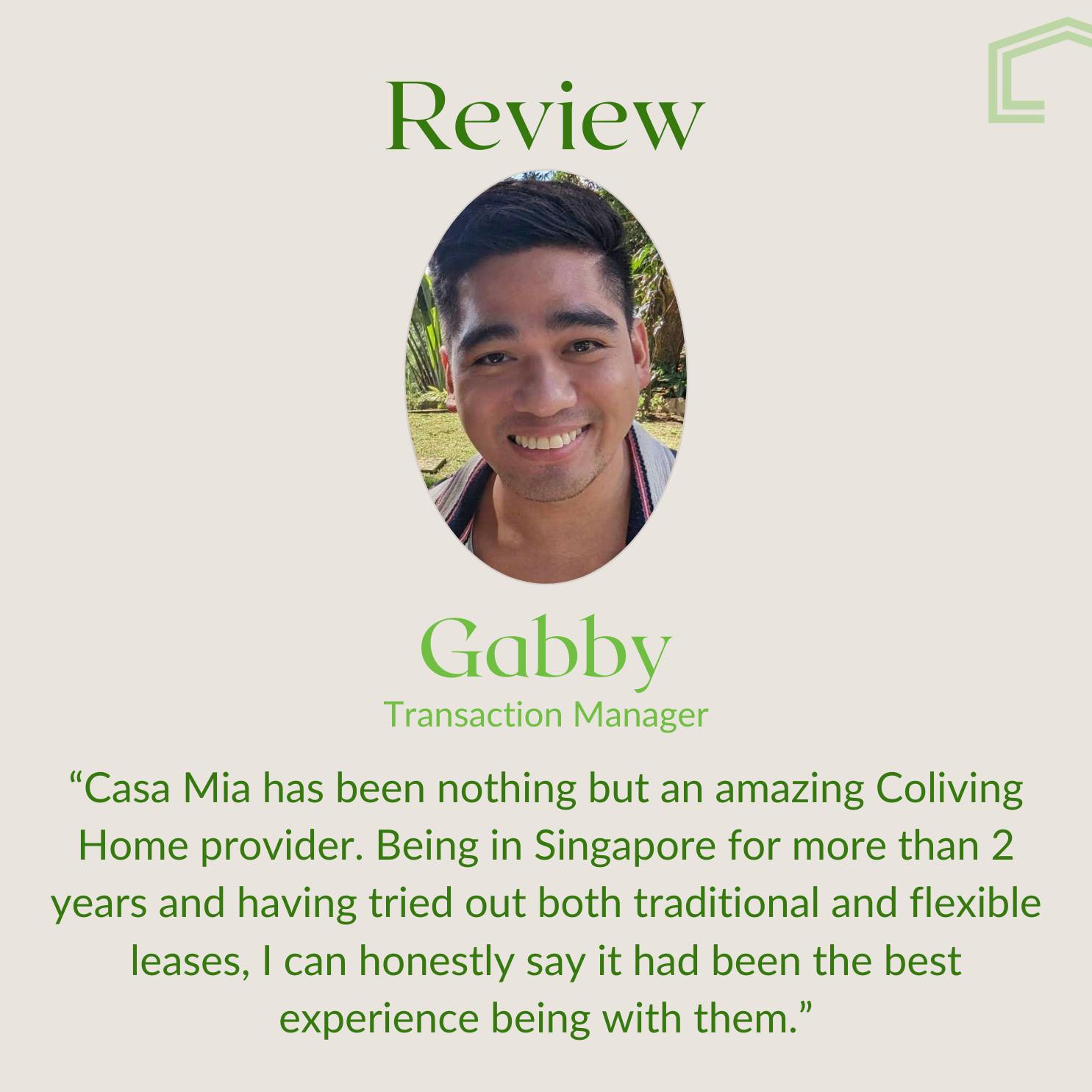
4. How to select a room to rent in Singapore?
It’s crucial to understand your budget and lifestyle needs for you to understand which room rentals can be a great fit for you. Here’s how you can identify -
Budget
- Monthly Income: Calculate your monthly income and determine how much you can comfortably allocate towards rent. A common rule of thumb is to spend no more than 30% of your monthly income on housing.
- Additional Costs: Consider additional costs such as utilities, internet, transportation, and groceries. Don’t forget to factor in a security deposit and any initial moving costs. You can find out more about the typical cost of living in Singapore, here!
Lifestyle Requirements
- Proximity to Work/School: How close do you need to be to your workplace or school? Consider the commute time and transportation options available.
- Social Life: Do you prefer living in a bustling area with nightlife and entertainment options, or a quieter neighborhood?
- Amenities: What amenities are important to you? Think about proximity to supermarkets, gyms, parks, and other facilities.
- Living Arrangements: Decide if you prefer living alone, with roommates, or in a coliving space. Each option has its own set of pros and cons.
Tenant Personas
To help you better understand your needs, we created detailed tenant personas based on common profiles we receive at CasaMia Coliving.
Persona 1: The International Student
- Profile: Maria, 22, from Spain, studying at the National University of Singapore (NUS).
- Budget: $800 - $1300 per month.
- Lifestyle: Needs to be close to NUS and prefers a vibrant community. Enjoys socializing and wants to live in a fully furnished space to avoid the hassle of buying furniture.
- Preferred Location: Areas near NUS such as Pasir Panjang, Holland Village, Sixth Avenue.
Persona 2: The Young Professional
- Profile: John, 27, marketing professional working in the CBD.
- Budget: $1,400 - $1,900 per month.
- Lifestyle: Wants a short commute to work and enjoys after-work social activities. Prefers living in a modern condo with facilities like a gym and pool.
- Preferred Location: Central Business District, River Valley
Persona 3: The Couple
- Profile: Alex and Jamie, 30, both working professionals.
- Budget: $2,000 - $2,500 per month.
- Lifestyle: Want a balance between work and leisure. Prefer a master room in a shared home or a small apartment.
- Preferred Location: Newton/Novena, Tiong Bahru, Little India.
Quiz: What Type of Rental is Right for You?
To make the process easier, we created this quick quiz for you to find out what type of rental best suits your needs:
What is your monthly budget for rent?
A) $500 - $1,000
B) $1,000 - $1,500
C) $1,500 - $2,000
D) $2,000+
How long is your daily commute to work or school?
A) Less than 15 minutes
B) 15 - 30 minutes
C) 30 - 45 minutes
D) 45 minutes or more
What amenities are most important to you?
A) Proximity to public transport
B) Nearby supermarkets and shops
C) Access to recreational facilities like a gym and pool
D) Quiet, family-friendly environment
Do you prefer living alone or with others?
A) Alone
B) With one roommate
C) In a shared home with multiple roommates
D) In a co-living space with a community
What is your ideal living environment?
A) Bustling city center
B) City fringe with a mix of urban and residential vibes
C) Suburban area with more space and greenery
D) Unique, character-filled neighborhood
This will help you understand your requirements better and choose the right room rental, shared living, or coliving on rent.
5. Types of Accommodations
In Singapore, there are various types of properties available for rent, each offering unique features and benefits. Understanding these options will help you make an informed decision based on your needs and preferences. Finding the right type of accommodation is crucial to ensuring a comfortable and enjoyable living experience.
HDB Flats
Housing Development Board (HDB) flats are a type of public housing developed by the Singapore government. They are the most common type of housing in Singapore, with about 80% of the population living in HDB flats.
Pros
- Affordability: Generally cheaper than private housing options.
- Community: Strong sense of community and neighbourliness.
- Accessibility: Often located near public transport, schools, and essential amenities.
Cons
- Amenities: Lack of luxury facilities like swimming pools and gyms.
- Lease Restrictions: Minimum rental period of six months
- Private landlords: Typically rooms in HDBs will be rented out by private landlords rather than coliving operators.
Ideal For
- Students and young professionals on a budget.
Condominiums (Condos)
Condos are private residential properties that come with a range of shared facilities and amenities, such as swimming pools, gyms, tennis courts, and security services.
Pros
- Facilities: Access to a wide range of amenities.
- Security: Gated communities with 24-hour security.
- Lifestyle: Often located in prime areas with easy access to city centres.
Cons
- Cost: Modern condos in Singapore are generally more expensive than HDB flats. But you can find older condos that will be a little cheaper.
- Space: Newer condos may have smaller living spaces compared to older HDB flats or walk-up apartments.
Ideal For
- Young professionals and couples who value convenience and lifestyle amenities.
- Expats looking for a comfortable living environment with modern facilities.
Walk-ups and Shophouses
Heritage shophouses are a unique blend of residential and commercial properties, typically located in Singapore’s historic districts, such as Tanjong Pagar, Katong or Tiong Bahru. They are known for their distinctive architecture and cultural significance.
Pros
- Character: Unique architectural features and historical charm.
- Privacy: Often come with en-suite bathrooms and private living spaces.
- Location: Situated in vibrant neighborhoods with rich cultural heritage.
Cons
- Cost: Can be more expensive due to their uniqueness and location.
- Maintenance: Older properties may require more upkeep.
Ideal For
- Individuals or couples looking for a unique living experience.
- Those who appreciate cultural and historical significance in their living environment.
Coliving Spaces
Overview
Coliving spaces are a modern housing concept that combines private living spaces with shared common areas. They often include additional services like cleaning, social events, and community activities for you to get to know other like-minded young professionals.
Pros
- Community: Strong emphasis on community living and social interactions.
- Convenience: Fully furnished with utilities and services included.
- Flexibility: Shorter lease terms and flexible rental agreements.
Cons
- Cost: Can be more expensive due to added services and amenities.
- Privacy: Shared common areas may reduce personal privacy.
Ideal For
- Young professionals and digital nomads who value community and networking opportunities.
- Individuals new to Singapore looking for a turnkey living solution.
Detailed Comparison Table
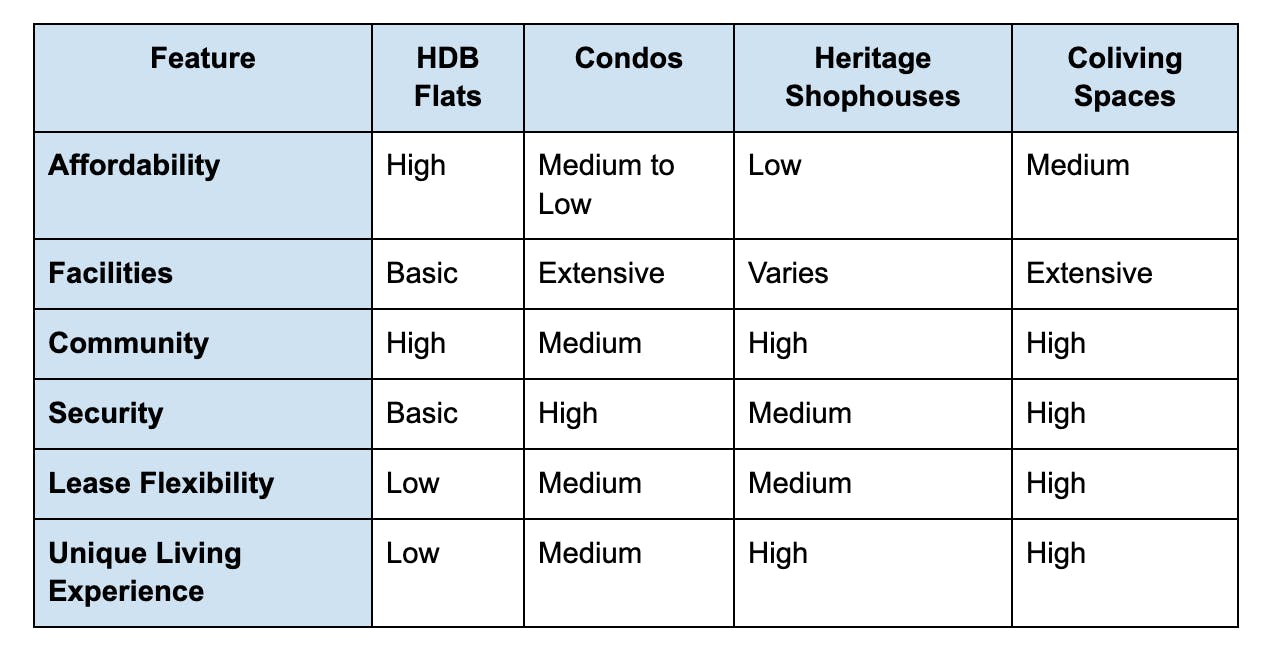
Understanding the different types of accommodations available in Singapore is essential to finding the perfect home that matches your budget, lifestyle, and preferences. Whether you choose an affordable HDB flat, a luxurious condo, a unique heritage shophouse, or a community-oriented coliving space, each option offers distinct advantages and considerations. Evaluate your needs and explore the possibilities to make an informed decision.
6. Budget-Friendly Room Rental Options
Finding affordable accommodation in Singapore can be challenging, but with the right approach and resources, it’s possible to secure a comfortable and budget-friendly rental. This section provides detailed information on budget-friendly options, tips for finding them, and examples of recent affordable rentals.
Detailed Listings of Affordable Rental Options
Shared Spaces in Coliving Arrangements
Tips for Finding Budget-Friendly Rentals
- Start Your Search Early: Begin looking for rentals well in advance to increase your chances of finding a good deal. Getting a good understanding of what is available is key. Popular listings can get snapped up quickly, so being proactive is key.
- Utilize Online Platforms: Use websites like Casa Mia Coliving, PropertyGuru, Rent in Singapore and Facebook groups to search for listings. Filter your search by price range and location to narrow down options.
- Network and Ask Around: Sometimes, the best deals are found through word of mouth. Ask friends, colleagues, and acquaintances if they know of any available rentals - usually these will be some of the best recommendations.
- Consider Roommates: Sharing an apartment with roommates can significantly reduce your rental costs. Look for listings that allow for shared living arrangements.
- Be Flexible with Location: While living in the city center is convenient, it’s often more expensive. Consider looking at properties in suburban areas or further from the MRT stations where rents are typically lower.
7. Premium Room Rental Options for Higher Budgets
For those who have a higher budget and are looking for more luxurious and comfortable living arrangements, Singapore offers a range of premium rental options. These options come with enhanced amenities, superior locations, and high-quality living environments. This section explores the various premium rental options available, tips for finding the best luxury rentals, and examples of high-end properties.
High-End Coliving Spaces
High-end coliving spaces offer a luxurious take on shared living, providing private rooms or suites within a community-oriented environment. These spaces come with a range of amenities and services designed to enhance convenience and comfort.
Examples of High-End Coliving Spaces
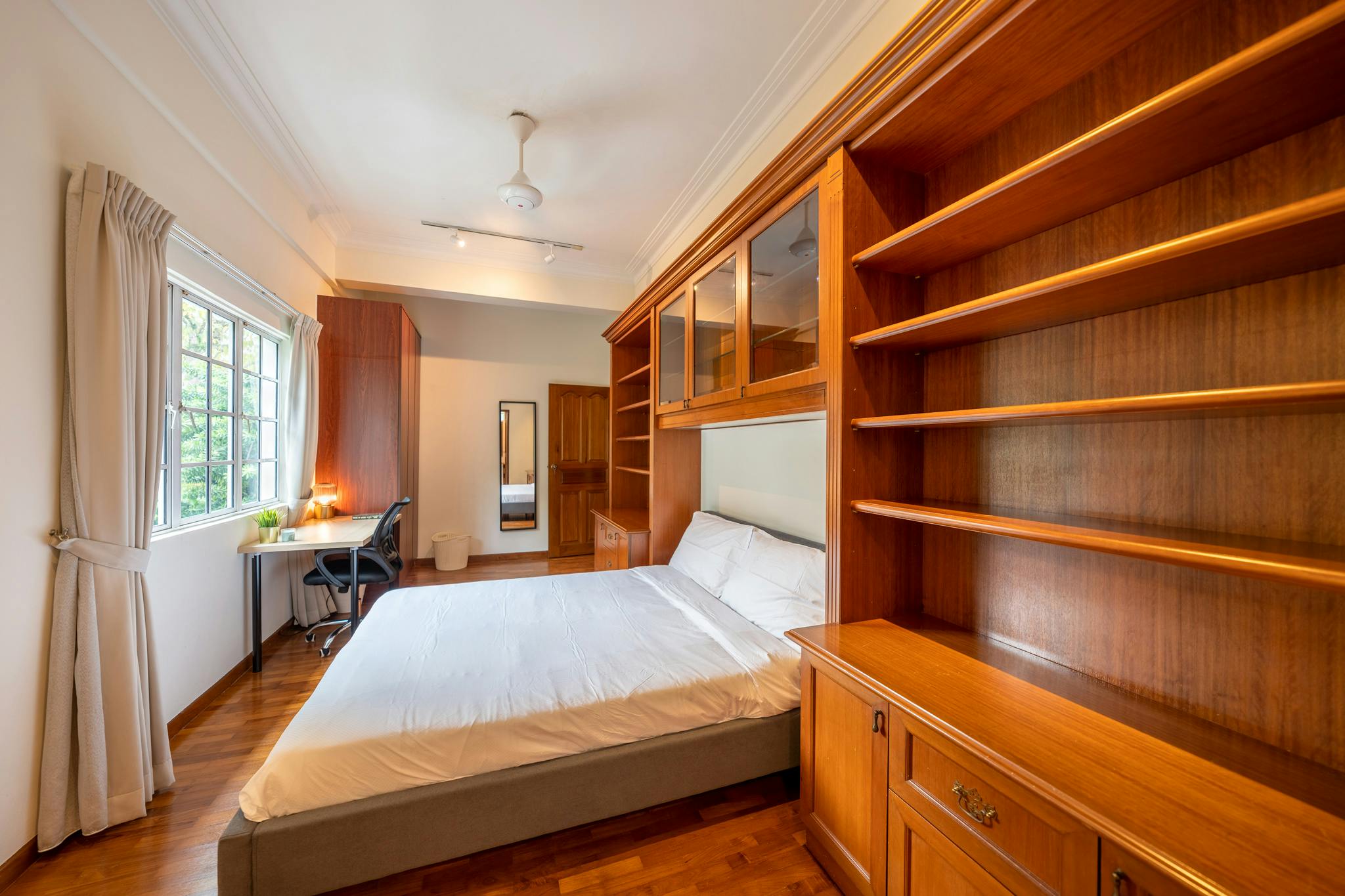
Pros
- Community and Networking: Opportunities to connect with other high-achieving professionals.
- Convenience: All-inclusive rent with utilities, cleaning services, and community activities.
- Modern Amenities: Access to co-working spaces, social kitchens, and gyms.
Cons
- Cost: Higher rental prices compared to standard coliving spaces.
- Privacy: Shared common areas may reduce personal privacy.
Tips for Finding the Best Luxury Rentals
- Research the Market: Stay informed about current rental prices and market trends to ensure you’re getting a fair deal.
- Visit Multiple Properties: View several properties to compare features, amenities, and overall value.
- Check Reviews and Testimonials: Look for reviews from current or past tenants to get a sense of the living experience and property management quality.
- Explore Coliving: Don’t hesitate to look up coliving spaces in singapore like CasaMia Coliving for luxury places in the most sought out neighbourhoods of Singapore.
8. Finding the Right Room to Rent in Singapore
Securing the perfect rental property in Singapore involves a strategic approach and utilizing various resources. This section provides a comprehensive guide to searching for rentals, including online platforms, tips for effective searching, and a list of top resources to help you find your ideal home. You can learn out more about finding your perfect rental, here!
Comprehensive Guide to Searching for Rentals
Step 1: Define Your Criteria
Before starting your search, it’s essential to define your criteria based on your needs and preferences:
- Budget: Determine your maximum monthly rent, including utilities and other expenses.
- Location: Choose areas based on proximity to work, school, public transport, and lifestyle preferences.
- Property Type: Decide between HDB flats, condos, heritage shophouses, or coliving spaces.
- Amenities: List the amenities that are important to you, such as a gym, pool, security, and parking.
Step 2: Use Online Rental Platforms
Online rental platforms are a convenient way to browse listings and find properties that match your criteria. Here are some top platforms to use:
Casa Mia Coliving: One of the best coliving operators in Singapore where you can rent a private room or a twin shared room across all neighbourhoods. Something for all budgets!
PropertyGuru: One of the largest property listing sites in Singapore, offering a wide range of residential and commercial properties.
Features: Advanced search filters, detailed property descriptions, high-quality photos, and virtual tours.
Tips: Set up alerts for new listings that match your criteria and save your favourite properties for easy access.
99.co: A user-friendly platform with a comprehensive database of rental listings.
Features: Interactive map view, price trends, and neighbourhood guides.
Tips: Use the comparison tool to evaluate different properties side by side.
SRX Property: Provides up-to-date listings and market insights.
Features: Price calculator, property valuation tools, and neighbourhood ratings.
Tips: Check the transaction history to understand rental price trends in your desired area.
RentInSingapore.com.sg: Dedicated entirely to rentals, offering detailed search filters and roommate listings.
Features: Filter by stay length, gender, and agent or owner listings.
Tips: Browse roommate listings if you’re looking to share a flat.
Step 3: Explore Social Media and Networking
Social media platforms and networking can also be valuable tools in your rental search:
- Facebook Groups: Join groups such as “FindYourRoomInSG” and “Rooms For Rent (Singapore)” to find listings posted by tenants and landlords.
- LinkedIn: Connect with real estate agents and property managers who can provide exclusive listings and insights.
- Word of Mouth: Inform friends, colleagues, and acquaintances that you’re looking for a rental. Personal recommendations can lead to great finds.
Step 4: Contacting Landlords and Agents
Once you’ve found properties that interest you, contact the landlords or agents to arrange viewings:
- Prepare Questions: Ask about the rent, lease terms, utilities, furnishings, and any additional fees. You can take a look at this blog where we go over what questions you should ask during your viewing!
- Schedule Viewings: If the properties don’t have virtual tours, try to visit multiple properties to compare options. Take notes and photos during each viewing.
- Negotiate: Don’t be afraid to negotiate the rent and terms, especially if you’re committing to a long-term lease - this might be trickier to do with official coliving operators as their prices are usually fixed.
9. Viewing and Evaluating Properties
Viewing and evaluating rental properties is a crucial step in finding the perfect home. This section provides a comprehensive guide on what to look for during property viewings, essential checklists, key factors to consider, and how to spot potential issues and red flags.
Checklist for Property Viewings
Before you visit a property, prepare a checklist to ensure you cover all important aspects during your viewing. Here’s a detailed checklist to guide you:
Exterior and Common Areas
- Building Condition: Check the overall condition of the building, including the exterior walls, roof, and any signs of damage or disrepair.
- Common Areas: Inspect common areas such as lobbies, hallways, staircases, and elevators. Ensure they are well-maintained and clean.
- Security Features: Look for security features like gated entrances, security cameras, and intercom systems.
Interior of the Property
- General Condition: Assess the overall cleanliness and condition of the property. Look for signs of wear and tear, such as cracks in the walls, peeling paint, or broken fixtures.
- Layout and Space: Evaluate the layout and space of the property. Ensure it meets your needs in terms of room sizes, storage space, and overall flow.
- Lighting and Ventilation: Check for natural lighting and ventilation in each room. Ensure there are enough windows and that they can be opened for fresh air.
Kitchen
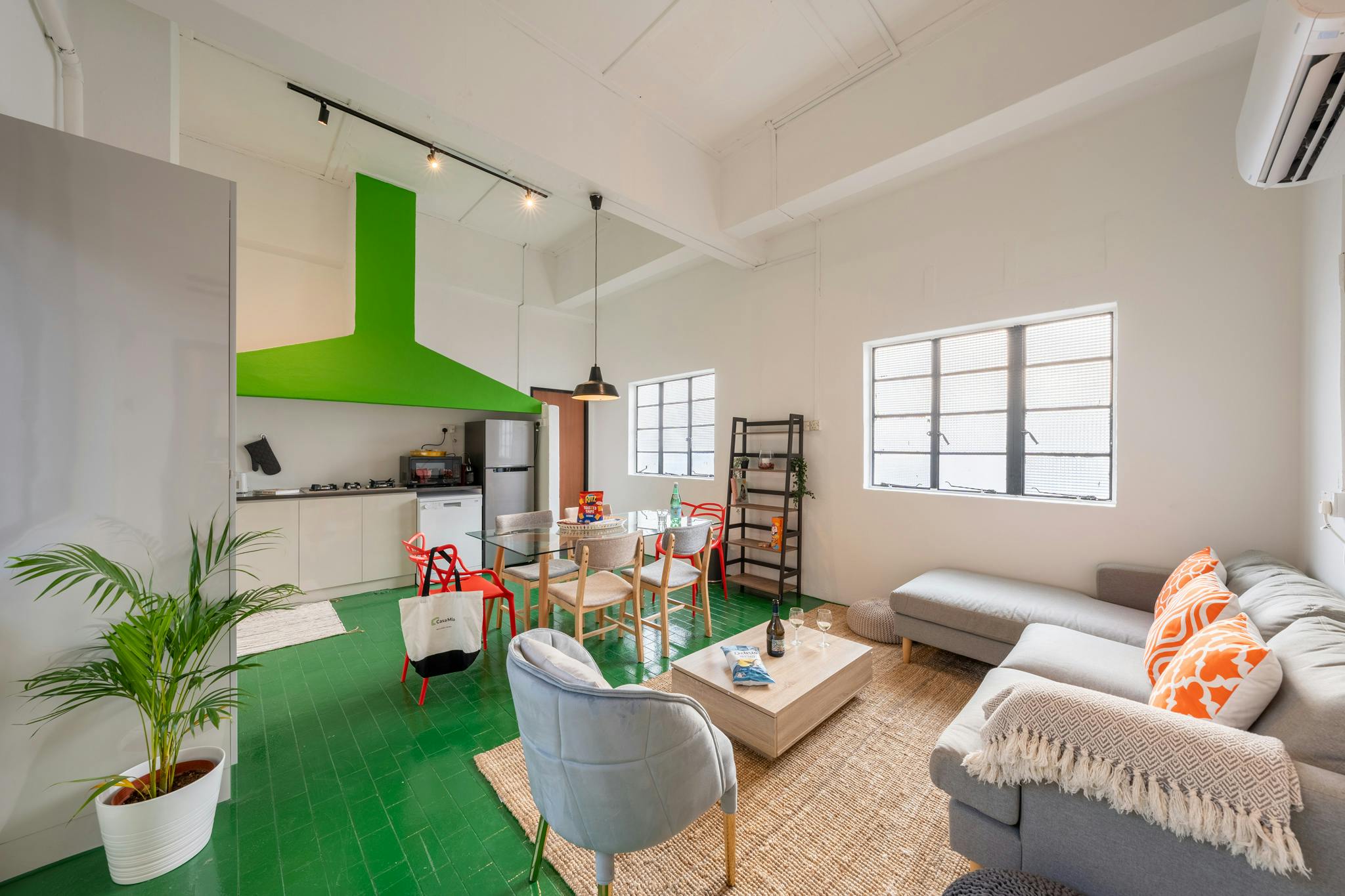
- Appliances: Inspect the condition and functionality of kitchen appliances such as the stove, oven, refrigerator, and microwave.
- Storage: Check for adequate storage space, including cabinets and pantry areas.
- Plumbing: Test the faucets and look for any signs of leaks under the sink.
Bathrooms
- Fixtures and Fittings: Ensure that all fixtures and fittings, such as faucets, showerheads, and toilets, are in good working condition.
- Water Pressure: Test the water pressure in the shower and sinks.
- Ventilation: Check for proper ventilation to prevent mold and mildew buildup.
Bedrooms and Living Areas
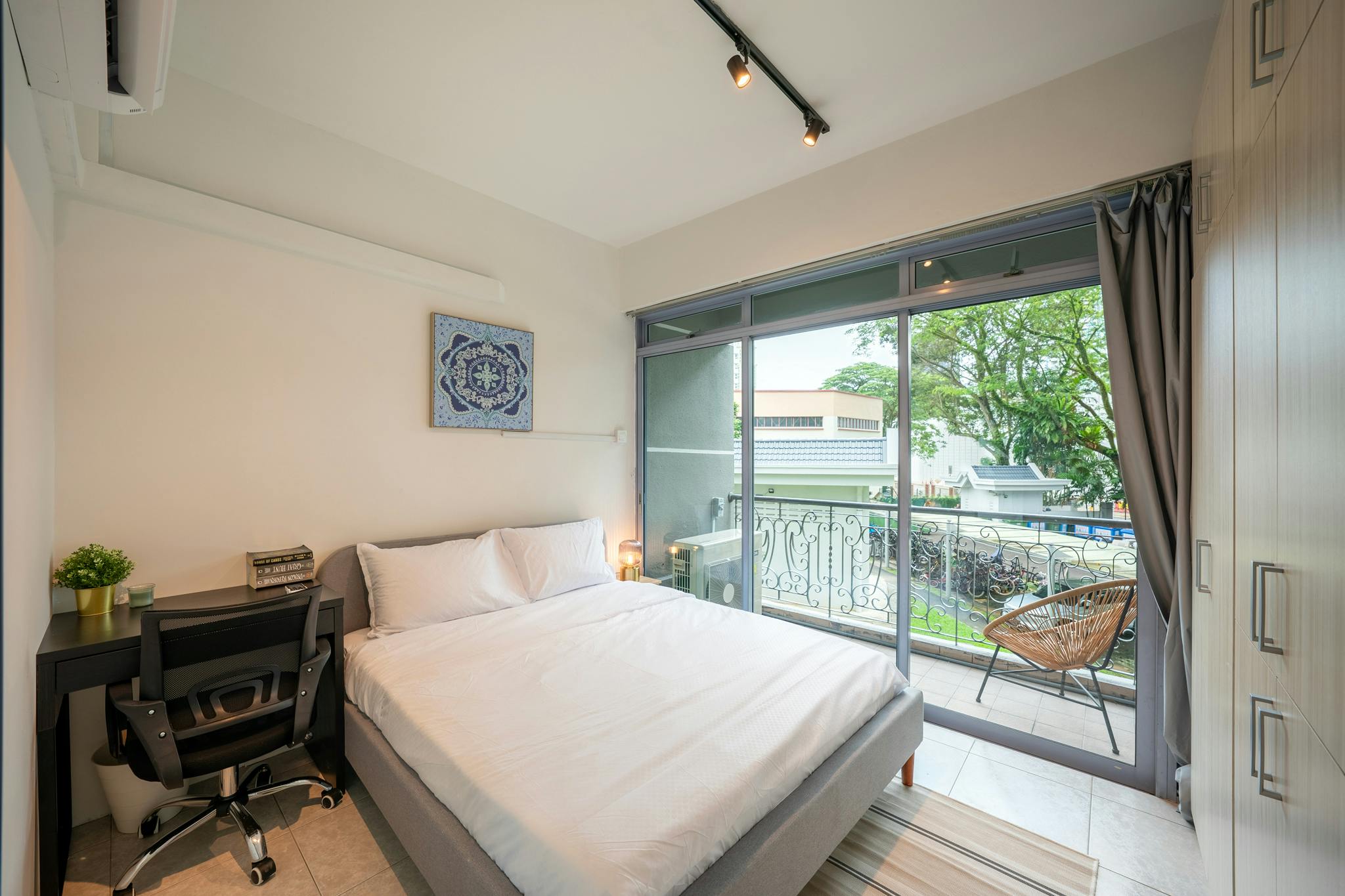
- Size and Layout: Assess the size and layout of the bedrooms and living areas. Ensure they meet your needs for furniture placement and comfort.
- Storage: Look for built-in wardrobes, closets, and additional storage options.
- Flooring: Check the condition of the flooring, whether it’s carpet, hardwood, or tile.
Additional Features
- Internet and Cable: Verify the availability of internet and cable connections.
- Utilities: Check the condition of heating, cooling, and electrical systems. Test the switches and outlets.
- Balcony/Terrace: If the property includes a balcony or terrace, inspect its condition and safety features.
10. Key Factors to Consider During Evaluations
When evaluating properties, consider the following key factors to ensure you make an informed decision:
Location
- Proximity to Work/School: Ensure the property is conveniently located near your workplace or school.
- Transportation: Check the availability of public transportation options such as MRT stations and bus stops.
- Neighbourhood: Assess the safety, amenities, and overall vibe of the neighbourhood. Visit during different times of the day to get a comprehensive view.
Rent and Additional Costs
- Rent Amount: Ensure the rent fits within your budget.
- Utilities and Services: Clarify what is included in the rent (e.g., utilities, internet, cleaning services) and what additional costs you may incur.
- Security Deposit: Confirm the amount of the security deposit and any other upfront costs.
Lease Terms
- Lease Duration: Understand the length of the lease and any penalties for early termination.
- Renewal Options: Ask about the possibility of renewing the lease and any associated conditions.
- Rules and Regulations: Review the property’s rules and regulations, including policies on pets, smoking, and modifications.
How to Spot Potential Issues and Red Flags
During your property viewing, be on the lookout for potential issues and red flags that could indicate future problems:
Structural Issues
- Cracks and Dampness: Look for cracks in walls and ceilings, as well as signs of dampness or mold.
- Foundation Problems: Check for uneven floors or doors that don’t close properly, which could indicate foundation issues.
Maintenance and Upkeep
- General Cleanliness: Assess the cleanliness of the property and common areas. Poor maintenance could indicate neglect.
- Appliance Condition: Ensure that all appliances are in good working order. Old or malfunctioning appliances may need replacement soon.
Landlord/Agent Interaction
- Responsiveness: Pay attention to the responsiveness and professionalism of the landlord or agent. Delays in communication could be a red flag.
- Lease Agreement: Carefully review the lease agreement for any unusual clauses or terms that seem unfair.
11. Signing a Lease and Moving In
Signing a lease and moving into a new rental property is an exciting but crucial phase. Ensuring you understand your lease agreement and prepare adequately for your move-in day can make the transition smoother and more enjoyable. This section covers essential steps and tips for signing a lease, preparing for the move, and settling into your new home.
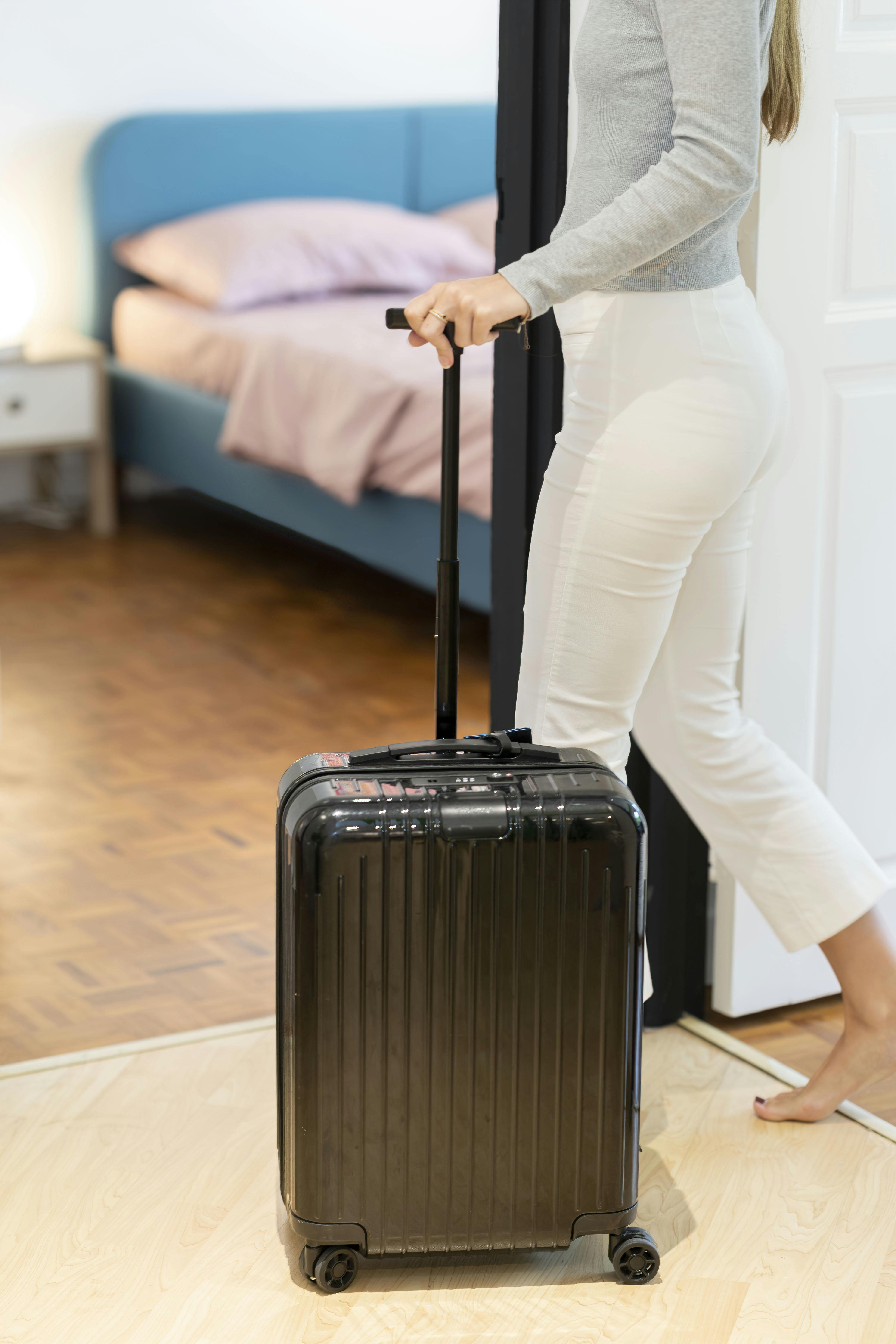
Understanding the Lease Agreement
Key Components of a Lease Agreement
- Lease Term: The duration of the lease, including start and end dates.
- Rent Amount: The monthly rent and the due date for payments.
- Security Deposit: The amount required as a security deposit and conditions for its return.
- Utilities and Services: Details about which utilities (water, electricity, internet) are included in the rent.
- Maintenance Responsibilities: Clarification of tenant and landlord responsibilities for property maintenance.
- House Rules: Any specific rules regarding noise, guests, pets, and use of common areas.
Reviewing the Lease
- Read Thoroughly: Carefully read the entire lease agreement. Don’t rush through it.
- Ask Questions: If any terms or clauses are unclear, ask the landlord or agent for clarification.
- Negotiate Terms: If there are terms you’re uncomfortable with, discuss and negotiate them with the landlord before signing.
- Get Everything in Writing: Ensure that all agreed-upon terms are documented in the lease agreement.
Legal Considerations
- Tenant Rights: Familiarize yourself with tenant rights in Singapore to ensure the lease complies with legal standards.
- Fair Tenancy Framework: Refer to the Fair Tenancy Framework for guidelines on fair leasing practices.
Preparing for Move-In Day
Planning and Organizing
- Set a Date: Coordinate with your landlord to set a move-in date.
- Hire Movers: If necessary, hire professional movers or arrange for help from friends and family.
- Pack Efficiently: Start packing well in advance. Label boxes clearly and pack essentials separately for easy access.
Checklist for Move-In Day
- Inspect the Property: Conduct a thorough inspection of the property upon arrival. Note any pre-existing damages or issues.
- Take Photos: Document the condition of the property with photos, especially any damages or defects. Share these with the landlord to avoid disputes later.
- Check Utilities: Ensure that all utilities (electricity, water, gas) are working properly. Set up internet and other services if not included.
- Collect Keys: Obtain all necessary keys, access cards, and security codes from the landlord.
Settling In
Unpacking and Organizing
- Unpack Essentials First: Focus on unpacking essentials such as bedding, toiletries, and kitchen items.
- Organize Your Space: Arrange furniture and personal items to make the space comfortable and functional.
Setting Up Utilities and Services
- Electricity and Water: Confirm that your electricity and water accounts are active. If required, set up billing in your name.
- Internet and Cable: Set up your internet and cable services. Choose a provider that offers the best plans for your needs.
- Cleaning Services: If desired, arrange for regular cleaning services to help maintain your new home.
Getting to Know Your New Neighborhood
- Explore the Area: Take some time to explore your new neighborhood. Locate nearby supermarkets, restaurants, parks, and other amenities.
- Meet Your Neighbors: Introduce yourself to your neighbors. Building a friendly relationship can enhance your living experience.
- Learn the Rules: Familiarize yourself with any community or building rules to ensure you comply with them.
Tips for a Smooth Transition
Communication
- Stay in Touch with Your Landlord: Maintain open communication with your landlord for any maintenance issues or concerns.
- Join Local Groups: Join local community groups or online forums to stay updated on neighborhood events and news.
Routine Maintenance
- Regular Cleaning: Keep your space clean and tidy to maintain a pleasant living environment.
- Report Issues Promptly: Report any maintenance issues to your landlord promptly to prevent further damage.
12. Where to Stay?
Choosing the right location for your rental property in Singapore is essential to ensure a comfortable and convenient living experience. This section explores various neighborhoods across Singapore, highlighting their unique characteristics, amenities, and suitability for different lifestyles. Whether you prefer the bustling city center or a tranquil suburban area, this guide will help you find the perfect place to stay.
Central Business District (CBD) and surrounding
The CBD is the heart of Singapore's financial and business activities, encompassing areas like Raffles Place, Tanjong Pagar, Marina Bay, Orchard, Bugis, and Chinatown. This area is ideal for professionals who work in the city and enjoy a vibrant urban lifestyle.
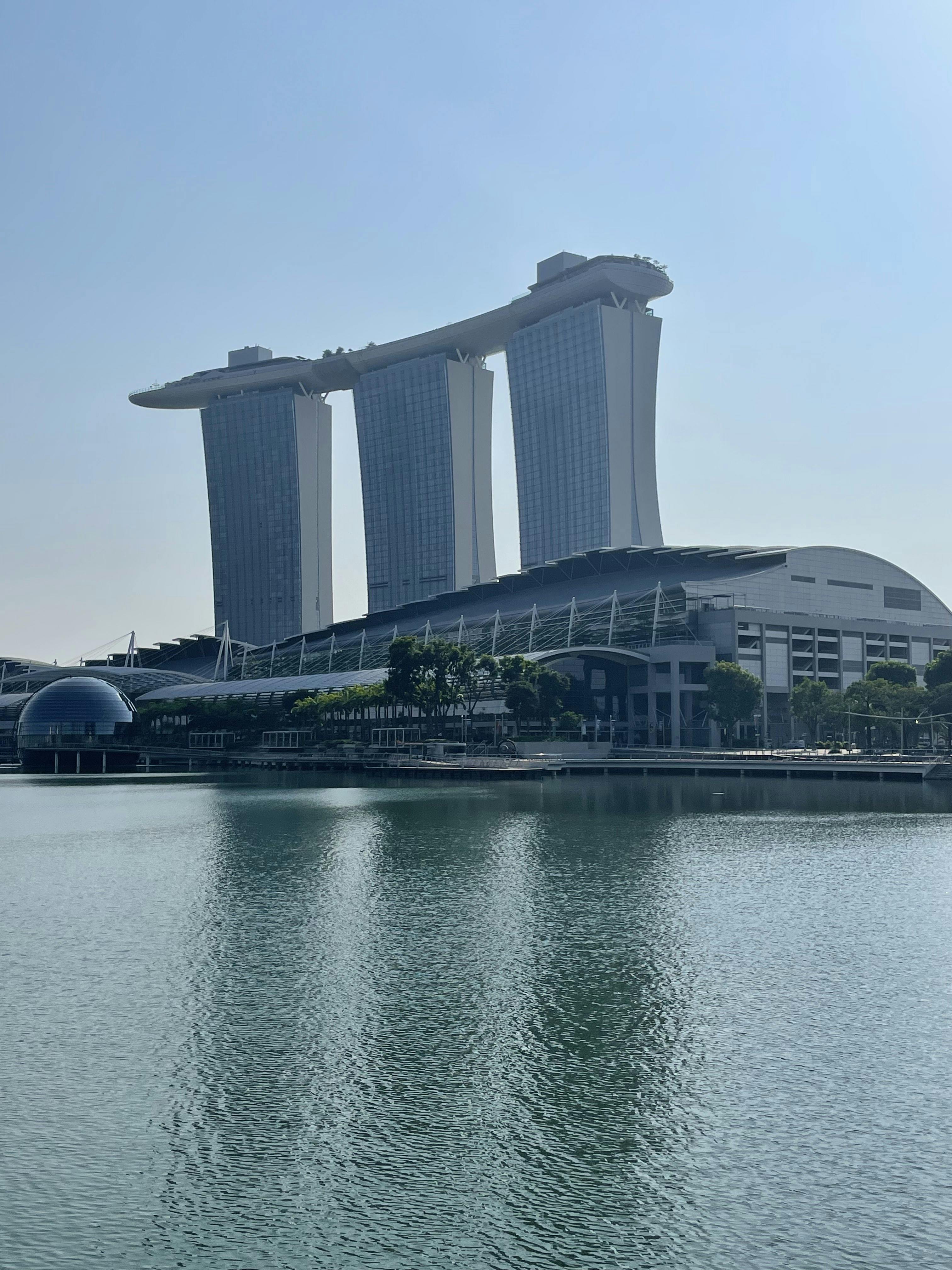
Key Features
- Proximity to Work: Short commute to major office buildings and business hubs.
- Amenities: Wide range of dining, shopping, and entertainment options. High-end malls like Marina Bay Sands and Orchard Road are located here.
- Transport: Excellent connectivity with multiple MRT lines and bus routes.
Suitable For
- Professionals working in the CBD.
- Individuals who enjoy an active nightlife and upscale amenities.
City Fringe
The city fringe includes neighborhoods such as Tiong Bahru, Queenstown, Newton, Novena, Little India, Jalan Besar, Geylang, Kallang, and Katong. These areas offer a balance between urban convenience and a more relaxed residential environment.
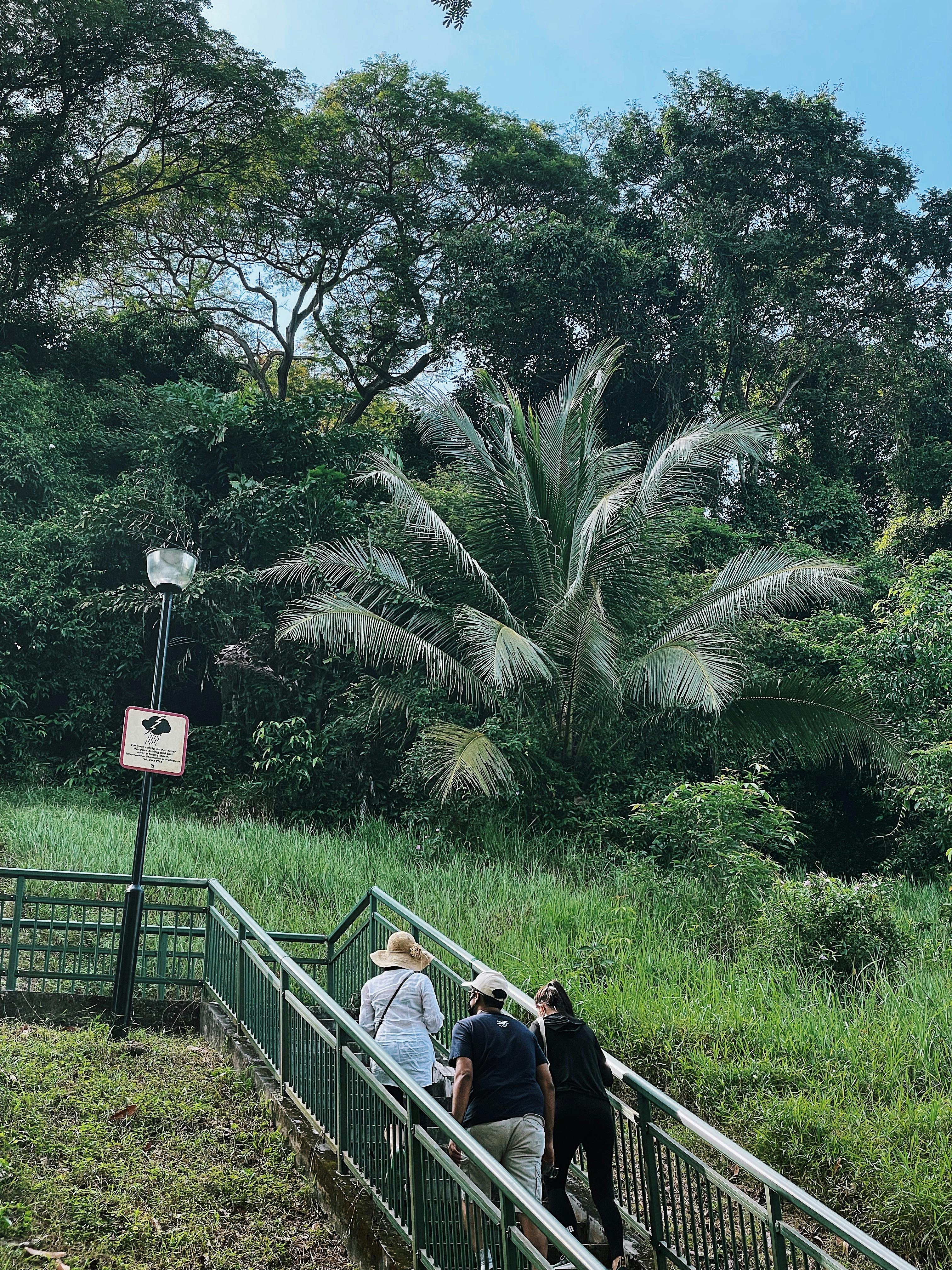
Key Features
- Accessibility: Close to the city center with good public transport connections.
- Lifestyle: Diverse dining options, trendy cafes, and local markets. Tiong Bahru is known for its hipster vibe, while Katong is famous for its Peranakan heritage.
- Green Spaces: Access to parks and recreational facilities, such as the Singapore Botanic Gardens and East Coast Park.
Suitable For
- Young professionals and couples who want to be near the city but prefer a quieter living environment.
Suburban Areas
Suburban areas include neighborhoods like Bukit Batok, Choa Chu Kang, Jurong, Yishun, Woodlands, Punggol, Pasir Ris, and Sengkang. These areas are typically more affordable and offer a more laid-back lifestyle.
Key Features
- Affordability: Lower rental prices compared to the city center and city fringe.
- Community: Family-friendly environment with good schools, community centers, and shopping malls.
- Green Spaces: Abundance of parks and nature reserves, such as Bukit Timah Nature Reserve and Sungei Buloh Wetland Reserve.
Suitable For
- Individuals looking for more space and a quieter environment.
- Those working in industrial or business parks located in the suburbs.
13. Singapore Neighborhood Profiles
River Valley
- Vibe: Neighbourhood vibes, active, expat friendly
- Amenities: Great community feeling, Singapore River great for running, relaxed dinner spots
- Transport: Fort Canning and Great World MRT station (Downtown and Thompson Line)
Tiong Bahru
- Vibe: Hipster, artistic, vibrant.
- Amenities: Trendy cafes, boutique shops, Tiong Bahru Market.
- Transport: Tiong Bahru MRT station (East-West Line).
Orchard
- Vibe: Historical, cultural, laid-back.
- Amenities: Plenty of malls, near Botanic Gardens
- Transport: Orchard and Somertset MRT station (North-South Line).
Katong
- Vibe: Historical, cultural, laid-back.
- Amenities: Peranakan eateries, heritage shophouses, East Coast Park.
- Transport: Paya Lebar MRT station (East-West Line, Circle Line).
Holland Village
- Vibe: Family-friendly, bustling, developing.
- Amenities: One Holland Village, strip of bars, cafes and restaurants
- Transport: Holland Village MRT station (Circle Line).
Little India
- Vibe: Buzzing, late-night food options, authentic
- Amenities: Mustafa Centre, Tekka Centre
- Transport: Little India MRT station (Downtown and North-East Line).
14. Making the Most of Your Rental Experience
Living in a rental property can be a fulfilling and enjoyable experience if you know how to make the most of it. This section provides tips on building positive relationships with roommates and landlords, maintaining your rental, personalizing your space, and integrating into the local community.

Building Positive Relationships
With Roommates
- Communication: Open and honest communication is key to maintaining a harmonious living environment. Set up regular meetings to discuss household matters and address any issues promptly.
- Respect Boundaries: Be mindful of your roommates' privacy and personal space. Establish clear rules regarding noise levels, guests, and shared spaces.
- Shared Responsibilities: Divide household chores and responsibilities fairly. Create a cleaning schedule to ensure everyone contributes to maintaining a tidy home.
- Conflict Resolution: Address conflicts calmly and respectfully. Find compromises and solutions that work for everyone involved.
With Your Landlord
- Professionalism: Maintain a professional relationship with your landlord. Communicate any issues or concerns clearly and respectfully.
- Timely Payments: Always pay your rent on time to build trust and avoid any disputes.
- Maintenance Requests: Report maintenance issues promptly and cooperate with your landlord to resolve them. Keep records of any requests and communications.
- Lease Compliance: Adhere to the terms of your lease agreement, including rules about noise, pets, and property modifications.
Maintaining Your Rental Room
Routine Cleaning
- Regular Cleaning: Keep your rental clean and organized by establishing a regular cleaning routine. Focus on high-traffic areas like the kitchen and bathroom.
- Deep Cleaning: Schedule deep cleaning sessions every few months to tackle less frequently cleaned areas such as windows, carpets, and behind appliances.
Preventive Maintenance
- Report Issues Early: Report any maintenance issues to your landlord as soon as they arise to prevent them from worsening.
- DIY Fixes: Handle minor repairs yourself if you're comfortable doing so. Simple tasks like changing light bulbs or unclogging drains can save time and effort.
Seasonal Maintenance
- Air Conditioning: Clean or replace air conditioning filters regularly to ensure efficient operation and maintain indoor air quality.
- Pest Control: Keep your rental pest-free by maintaining cleanliness and sealing any gaps or cracks where pests could enter.
Integrating into the Community
Getting to Know Your Neighbours
- Introduce Yourself: Take the initiative to introduce yourself to your neighbors. Building good relationships can enhance your living experience.
- Community Events: Attend local community events and gatherings to meet new people and integrate into the neighborhood. Find out more about making friends when moving abroad, here!
Exploring Local Amenities
- Local Businesses: Support local businesses by shopping at nearby stores, dining at local restaurants, and using neighborhood services.
- Recreational Facilities: Take advantage of nearby parks, gyms, and recreational facilities to stay active and engaged.
Staying Informed
- Local News: Stay updated on local news and events through community newsletters, social media groups, and local news websites.
- Safety and Security: Familiarize yourself with local safety and security measures. Know the locations of nearby hospitals, police stations, and emergency services.
15. Navigating Legal and Safety Issues
Understanding your legal rights and ensuring your safety are crucial aspects of renting a property in Singapore. This section provides essential information on tenant rights, common legal issues, safety tips, and emergency contacts to help you navigate these important considerations.
Understanding Tenant Rights and Responsibilities
Legal Framework
- Residential Tenancies Act: Familiarize yourself with the Residential Tenancies Act, which outlines the rights and responsibilities of both tenants and landlords in Singapore.
- Fair Tenancy Framework: Refer to the Fair Tenancy Framework for guidelines on fair leasing practices and dispute resolution.
Tenant Rights
- Right to a Habitable Home: Your rental property should be safe, clean, and in good repair. Landlords are responsible for maintaining the property to a livable standard.
- Right to Privacy: Your landlord must respect your privacy and provide reasonable notice before entering the property, except in emergencies.
- Right to Fair Treatment: You should not be discriminated against based on race, gender, nationality, or other personal characteristics.
Tenant Responsibilities
- Paying Rent: Ensure timely payment of rent as specified in your lease agreement.
- Maintaining the Property: Keep the property clean and report any maintenance issues promptly. Avoid causing damage beyond normal wear and tear.
- Adhering to the Lease: Comply with the terms of your lease agreement, including house rules and restrictions.
Common Legal Issues and How to Address Them
Security Deposit Disputes
- Documentation: Document the condition of the property with photos and a checklist when you move in and out. This helps resolve disputes over damages and the return of your security deposit.
- Written Agreements: Ensure all agreements regarding the security deposit are in writing and signed by both parties.
Eviction
- Notice Period: Landlords must provide adequate notice before evicting a tenant, usually specified in the lease agreement.
- Legal Grounds: Evictions must be based on legal grounds, such as non-payment of rent or breach of lease terms. Unlawful eviction can be challenged in court.
Lease Termination
- Early Termination: Review your lease agreement for clauses on early termination and penalties. Negotiate terms with your landlord if you need to terminate the lease early.
- Mutual Agreement: Both parties can agree to terminate the lease early without penalties if mutually beneficial.
Safety Tips for Renters
Home Safety
- Locks and Security: Ensure all doors and windows have secure locks. Consider additional security measures, such as a peephole or security camera.
- Fire Safety: Check that smoke detectors are installed and functioning. Know the location of fire extinguishers and emergency exits.
- Electrical Safety: Avoid overloading electrical outlets and ensure all electrical appliances are in good working condition.
Personal Safety
- Neighborhood Safety: Research the safety of the neighborhood. Choose a location with low crime rates and good community policing.
- Emergency Contacts: Keep a list of emergency contacts, including the nearest hospital, police station, and fire department.
Online Safety
- Scams and Fraud: Be cautious when dealing with rental listings online. Verify the legitimacy of listings and landlords before making any payments. Get our best tips and tricks, here!
- Secure Transactions: Use secure payment methods for rent and deposits. Avoid paying in cash unless you receive a receipt.
Emergency Contacts and Resources for Renters
Important Contacts
- Police: 999
- Fire and Ambulance: 995
- Non-Emergency Ambulance: 1777
- Civil Defence Emergency Hotline: 1800-280-0000
Tenant Support Services
- Consumers Association of Singapore (CASE): Provides support for tenant disputes and consumer rights issues.
- Ministry of Manpower (MOM): Offers resources and support for foreign workers and expatriates.
- Fair Tenancy Industry Committee (FTIC): Provides guidelines and mediation services for tenancy disputes.
Online Resources
- Legal Advice: Websites like Singapore Legal Advice offer guidance on tenant rights and legal issues.
- Community Forums: Join forums and social media groups where tenants share experiences and advice on renting in Singapore.
16. Conclusion
Renting a property in Singapore can be a rewarding experience, whether you’re a local resident, an expatriate, or a student. This guide has provided comprehensive information and practical advice to help you navigate every step of the rental process, from understanding your needs to settling into your new home.
Summary of Key Points
Understanding Your Needs
- Identify your budget and lifestyle requirements to narrow down your rental options.
- Create tenant personas to better understand your specific needs and preferences.
Types of Accommodations
- Explore different types of accommodations, including HDB flats, condos, heritage shophouses, and coliving spaces.
- Compare the pros and cons of each type to determine the best fit for you.
Budget-Friendly Rental Options
- Find affordable rental options and use tips to secure the best deals.
- Utilize interactive tools like rent calculators and budget planners to manage your finances.
Premium Rental Options for Higher Budgets
- Discover luxury rental options that offer enhanced amenities and prime locations.
- Learn tips for finding and securing high-end properties.
Finding the Right Rental
- Use online platforms, social media, and networking to find suitable rental listings.
- Contact landlords and agents to arrange viewings and negotiate lease terms.
Viewing and Evaluating Properties
- Follow a detailed checklist during property viewings to assess the condition and suitability of potential rentals.
- Consider key factors such as location, rent, and additional costs when evaluating properties.
Living with Your Landlord—Should You Do It?
- Understand the pros and cons of living with your landlord.
- Learn tips for maintaining a positive relationship and navigating potential issues.
Signing a Lease and Moving In
- Understand key components of a lease agreement and ensure all terms are clearly documented.
- Prepare for move-in day with checklists and tips for a smooth transition.
Making the Most of Your Rental Experience
- Build positive relationships with roommates and landlords.
- Maintain and personalize your rental to create a comfortable living environment.
- Integrate into the local community by getting to know your neighbors and exploring local amenities.
Navigating Legal and Safety Issues
- Understand your tenant rights and responsibilities under Singapore law.
- Address common legal issues and ensure your safety with practical tips and emergency contacts.
Renting a property in Singapore offers a unique opportunity to experience the vibrant culture, diverse communities, and modern amenities that the city-state has to offer. By following the guidance provided in this comprehensive rental guide, you can make informed decisions and enjoy a positive rental experience.
Whether you’re searching for a budget-friendly room in an HDB flat, a luxurious condo in the heart of the city, or a unique heritage shophouse, Singapore’s rental market has something for everyone. Take the time to explore your options, utilize the resources and tools available, and don’t hesitate to seek professional advice when needed.
17. Contact for Further Assistance
If you need further assistance or have any questions about renting in Singapore, feel free to reach out to us, tenant support services, or community forums. They can provide valuable insights and help you navigate the rental process with confidence - happy room hunting! :)

